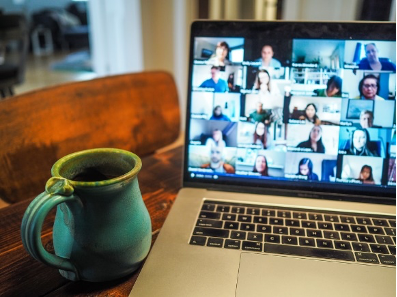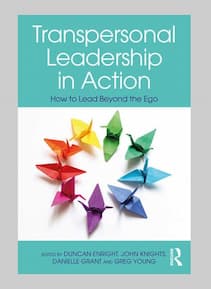Written by George Perry, May 2021
As we enter the month of May, look back to this time last year and records of Covid-19 infections in the UK were just starting to plateau (in what is now deemed the ‘first wave’). Looking at the situation this year, we can see that daily cases have now dipped below what they were 12 months ago (and this was prior to availability of mass testing back then), and they continue to decline.
Later this month we are on course for the next stage of the roadmap out of lockdown, and more restrictions are due be lifted in England, with the final ‘unlocking’ set to occur next month. Could it really be that the last lockdown was the last lockdown?
Letting go of the Divide
I’m sure that this would come as welcome news to many, but interestingly, even though things will start to open up and society at large is set to get going again, to return to life we once knew, there are some things that came out of this past year of lockdowns that are set to continue – but this time through choice.
There will no longer be the previous levels of separation between home and work life that had persisted for so long. Many of us were thrust into a work-from-home culture by necessity, but this is now one element of 2020 and beyond that looks set to remain dominant. Whatever mask we had worn at work has now, over the course of 12-14 months, been significantly eroded.
Even though the idea of working from home wasn’t an entirely new concept that was kicked up by the pandemic, for the first time for many of us, we were forced to accept work life into our home life.
 Active Agents
Active Agents
The speed and agility in which many of these measures were put into place were done in such a way that it could almost be viewed as some gigantic social experiment. It’s an experiment though, where no one was particularly pulling the strings and all of us actively played our parts as subjects who could skew the results in any direction.
However, as such, this means that, as active agents, we actually had the opportunity to shape the outcome of this seemingly haphazard experiment, and what it would unfold to emerge as the new work-life balance.
The change in the way we work, and that blurring of the boundary between home and work life, is not set to go away any time soon – and this is now through choice. What is interesting to pick up on first here, is that now it has happened, there is no going back – but why was there resistance to it before?
Why Resist?
It seems that people had essentially been fearful of such a large scale social upheaval, and perhaps understandably so, if you start to understand why. The issue that worried many people was allowing work life to permeate into our home life too much, thus meaning there would no distinction between the two as the lines become constantly blurred.
Essentially, that means that our bosses would be free to call us to work anytime, because our workplace had spilled over into our ‘homeplace’. Work would now invade our sanctuary, our last bastion of privacy – our homes.
In other words, we’d have nowhere to run!
Essentially, that means the fear that was held was that we would need to be working all the time and never switching off – both metaphorically and quite literally.
Well, guess what? Bosses don’t want to be working all the time either!
They too have lives outside work, and a work-life balance they wish to maintain. Therefore, what is an interesting element to pick up on from this 12+ months’ spontaneous experiment, is that despite all the negative connotations associated with ‘self-isolation’, a majority of people actually prefer the new set up that consists of working partially or fully from home to the way that work life had been carried out before.
Compromise
Managers and their subordinates have, apparently, been able to work out a satisfactory working arrangement from the events of the past year or so. I’m sure this would’ve involved a lot of pushing and pulling over the past few months, but otherwise it appears that businesses are happy with allowing workers to stay at home and work according to their own devices (quite literally).
I’m sure we owe most of that to the internet, and be glad that this pandemic struck us in 2020 and not 1990. Certainly, those older concerns about lack of human interaction, or not being able to collaborate on assignments, have been largely silenced as we’ve been able to witness what the internet can really do for modern business practices.
What has yielded as the results of this live and organic social experiment is that people have grown accustomed to their WFH lifestyles, and now don’t want to return fully to the office. In a recent study conducted by Leadership IQ, they found that 85% of people would prefer to continue working from home at least a few days of the week, going forward from now.
The Good from the Bad
So, there must be something about the shift to WFH, which despite any prior reservations, people now like more than the old-fashioned way of turning up to the workplace every day. Well, this applies to those of us who have been lucky enough to be able to continue our jobs on a WFH basis throughout this global pandemic, that is to say.
Nevertheless, you could say that at the very least there has been some positive aspect to arise from the Covid-19 public health crisis, as it has provided a revolution in the way we work that fits modern lifestyles. All the tools had been there for us to make this move, it just took something monumental to mark that change, and also stamp out all the scepticism that had lingered.
Teleworking, as it used to be called, was nothing new by 2020, it’s just that not all organisations and employees were keen to fully adopt it – and there could be several reasons for this. For example, any opposition to working from home could’ve been something rather practical, such as the fear of missing social connections or not being able to work efficiently.
Indeed, the same concerns that had existed still persist. After months of lockdown and being forced to work from home, many workers are missing those face-face moments with colleagues which allow the opportunity to build relationships, and are now yearning to get back in the office, mixing with real people rather than staring at squares full of faces on our screens.
Important elements that we previously had taken for granted in our lives as it was the expected norm, such as those water cooler chats, or those chance encounters in the elevator, we are now missing and want back. Indeed, there will still be plenty of good reason for people to come together in shared work spaces, even if it is simply for the purpose of general team building, or it could include in-person training, or the classic example of conducting business meetings or negotiations – in actual physical rooms.
The Best of Both Worlds
It’s about finding a balance, and for this reason, many businesses are now seeking to provide a hybrid approach to work patterns, whereby workers are required to come into the office part of the week, but as the results from different studies show, workers now prefer to spend a lot more time working from home as part of their jobs.
Various elements had already been in place for hybrid work life, with many offices adopting hot desk schemes, and only requiring staff to come in for meetings or important events that required heads in a room, it’s just that the pandemic ramped this up tenfold. Now, it seems after we got used to it, the majority of people now prefer a role that allows them to work from home more often.
It doesn’t look like ‘the office’ or the workplace is set to disappear completely, its just that something that had been going in this direction for a while has reached a point of no going back, and from now on people will prefer a work life that encompasses more WFH aspects than the daily need to turn up at an office.
Aside from missing those social connections, any doubts that had previously existed on this front can be eschewed, as we have all just proved that we can do it – albeit under totally unexpected and adverse conditions, and not really in a way that anyone would ever have planned.
 Putting People First
Putting People First
As part of this process of the work place becoming intertwined with people’s home and personal life, lessons have been learned about how businesses treat people. Businesses are interested in how the way we work can be folded into positive business practices. As you’ll see, this ties into how the values of the next generation are more focused on ‘doing the right thing’ than ever before.
For the next generation of leaders, acting ethically and sustainably is fast becoming the most important factor when it comes to choosing their careers. Keyed into this is workers’ need to work for an organisation that is authentic and shows humility.
A recent study from Docebo shows that 95% of millennials say that they seek a healthy work-life balance as a top priority when searching for a job.
In the same study, the research revealed that the next emerging generation prefer to work for organisations that have a purpose and a raison d’etre that goes beyond merely profit-seeking. The research revealed that 27% of employees are more likely to stay with an organisation who they believe has a higher purpose.
This indicates that the way that managers must meet the needs of the next generation of leaders permeates the way that business must be done, to its very essence.
Making a Difference
In another study conducted by Deloitte of more than 27,500 millennials and Gen Zs, which interestingly was conducted both before and after the pandemic last year, they also revealed that having a sense of greater purpose is incredibly important to the next generation of leaders.
Overall, three-quarters of respondents said that the pandemic has made them more sympathetic toward others’ needs and that they intend to take actions to have a positive impact on their communities. Also, three in five of those surveyed felt that businesses played a positive role in the pandemic, meaning that 40% of them think businesses haven’t.
It seems that the current trend for workers to feel that their work contributes something important to society is a direction that is set to continue. In the latest Leadership Comes Alive podcast episode, Peter Collyer mentions this when he talks about Developing Future Talent.
Peter Collyer is an experienced leadership manager, currently working as chief people officer at Ted Baker PLC, and he talks about ways for organisations to develop future leaders. He feels that now is an opportune time that we can address the future of work, due to witnessing what has just happened in the past year in terms of workplaces redrawing boundaries.
He believes that the transpersonal journey is incredibly holistic as it brings together all of our emotions and our behaviours, and expectations of leadership have evolved and changed. He goes onto say that even in his role working in HR over the last 30 years, he has seen a significant shift away from a focus on administrative processes towards holistic care and attention of people’s wellbeing, personal motivation, and overall helping them to “become better human beings”.
The New Way of Work
Peter highlights that the past 12-15 months for HR professionals has been a time where they have had to particularly prove themselves, due to the pressures of the pandemic that saw factors evolving at a lightening pace for people managers. This is because they were now needing to manage people in a way that not only touches their work life, but their home life too.
Also, linking in with the emerging change for work lives of the next generation placing a higher value on sustainability, ethics, and how people are treated; he says that, “There’s no such thing as a great company without great people” and continues by saying that when it comes to making a difference, “Every single person plays their role”.
He believes that the transpersonal journey helps to get under the skin of this, and helps explore what is going on for the individual, at multiple levels.
Linking in with the pandemic, Peter says that we can see how it’s brought the vulnerability of life under the spotlight, like never before. It has highlighted the importance of caring for each other and the importance of wellbeing – whether it is physical, mental, or spiritual.
Lots of experiences have recently been opening up to managers that they haven’t really had a lot of training in or had put investment into in the past.
Having a Purpose
Peter also emphasises that it is important to link values to purpose. This has been accepted for a long time, but now we’re beginning to spend more quality time at an individual level asking questions such as, “Why I am here?” and “What difference can I make in the world?”
If we link our values to these kinds of questions, then there is something hugely powerful about this process that makes a difference. Joining the dots between the values, the mission, and the behaviours that we see in an organisation, can be hugely rewarding if we get it right.
Compassion and caring ought to be seen as positive traits for an organisation to have, which comes from its workers. Previously, this may have been seen as a weakness of organisations as people sought to separate the human value and need to make a profit.
However, it has become apparent that workers now wish for their employment to have a greater meaning, and never has there been a bigger emphasis on this than now, as the boundaries between our work and home lives have become forever blurred.
The Transpersonal Journey
Peter finishes by telling us his top tips for leaders wishing to make their organisations healthy, happy, ethical, future-fit and sustainable, in other words, to go on the transpersonal journey:-
- It starts with us – each individual. Having clear philosophies and having a clear vision is the key. Be clear about who you are and what you stand for first, before you can start helping others.
- Be braver – these are challenging times and require us to be more courageous than before. Take the step respectfully. Be ever curious.
- Be judgement-free – something which is very rare in today’s world.
- Network with other people who have gone through the transpersonal journey – there are different components to this that we can learn from each other. Find out what the techniques are and experiment!

